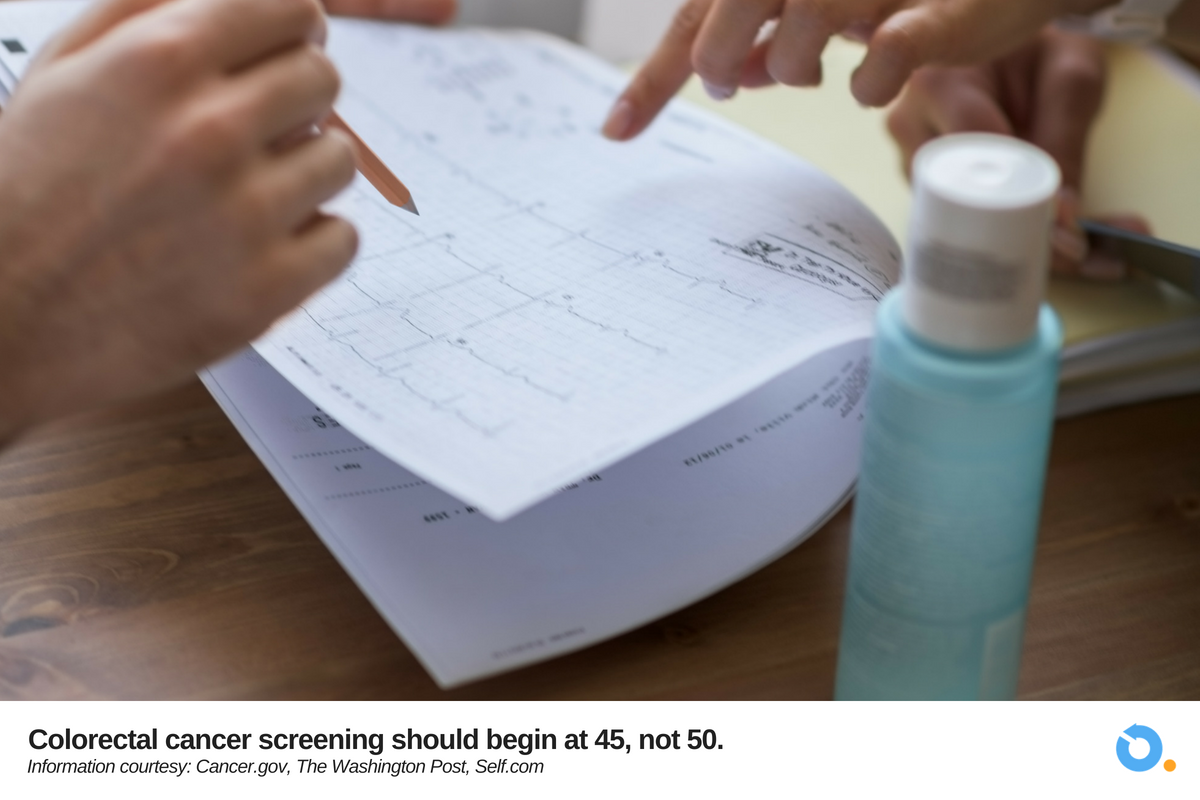Landmark change in ACS guidelines for colorectal cancer screening
The American Cancer Society has recently updated[1] its official guidelines regarding the screening of colorectal cancer. The new recommendations suggest that all adults above the age of 45, should get screened for colorectal cancer. Previously, this was suggested for ages 50 and above.
 Why this change?
Why this change?
ACS made these changes last week, and explained that there was an extensive analysis of reports coming in, about young people getting diagnosed with colorectal cancer, and this prompted the change. They have also maintained that the new recommendations only apply to people considered at “average risk”[1:1] for the disease.
So, what is the “average risk” category for colorectal cancer?
The American Cancer Society has set up a set of guidelines that defines who fits into the ‘average risk’ category for colorectal cancer, enlisted below.
For screening, people are considered to be at average risk if they do not have:
- A personal history of colorectal cancer or certain types of polyps
- A family history of colorectal cancer
- A personal history of inflammatory bowel disease (ulcerative colitis or Crohn’s disease)
- A confirmed or suspected hereditary colorectal cancer syndrome, such as familial adenomatous polyposis (FAP) or Lynch syndrome (hereditary non-* polyposis colon cancer or HNPCC)
- A personal history of getting radiation to the abdomen (belly) or pelvic area to treat a prior cancer
Source: Cancer.org[1:2]
Trends in colorectal cancer incidence rates
Over the last 20 years, the incidence rates for colorectal cancer have reduced significantly for people aged 54 or more. This is largely attributed to increase in awareness & screening that allowed the identification and removal of polyps before they became malignant in this age group.
However, there has been a 51% increase in the incidence rates of the disease for people younger than 50. For the sub-50 age group, colorectal cancer-related deaths have also been on the rise[2].
Adults born around 1990 are at double the risk[3] of contracting colon cancer, and four times the risk of contracting rectal cancer, compared with the generation that was born around 1950. As the new generation grows older, their increased disposition to the disease will still linger.
About 50,000 people are expected to die of colorectal cancer this year[4].
Doctors welcome the move to prepone screening
The new recommendations have been received well within the medical community. So far, most doctors have attributed the rising cancer incidences and cancer-related deaths among young people to increasing obesity, a lack of exercise and processed food consumption. The exact reasons still remain unclear[2:1].
“The rate of occurrence of colorectal cancer is rising in patients falling under a younger age bracket, compared to past trends. This calls for an early screening age (45 and above) for colorectal cancer.” – Dr Amit Jotwani (Senior Radiation Oncologist & Co-founder, Onco.com)
Most primary-care physicians, GPs and pre-cancer diagnostic centres are expected to adopt the new recommendations, and to begin referring younger patients for regular screening.
However the US Preventive Services Task Force (an independent panel that evaluates screening tests) still hasn’t lower the recommended screening age from 50[5]. It is unclear whether they will consider the risk mitigation powerful enough to change this number, as they have not chosen to do so in the past.
The ACS has arrived at a landmark decision. It has extended the studies conducted by the same task force, and included recent statistical data on the rising incidence of colorectal cancer among younger people. The results of this study conclusively prove that earlier screening can be potentially life-saving for a new generation of patients.
- Revised-Guidelines/ACS – https://www.cancer.org/cancer/colon-rectal-cancer/detection-diagnosis-staging/acs-recommendations.html ↩︎ ↩︎ ↩︎
- CNN – https://edition.cnn.com/2017/08/08/health/colon-cancer-rectal-cancer-deaths-study/index.html ↩︎ ↩︎
- Fox – http://fox2now.com/2017/02/28/born-in-the-90s-your-colon-cancer-risk-could-be-rising/ ↩︎
- Cancer.org – https://www.cancer.org/cancer/colon-rectal-cancer/about/key-statistics.html ↩︎
- USPSTF – https://www.uspreventiveservicestaskforce.org/Page/Document/RecommendationStatementFinal/colorectal-cancer-screening2 ↩︎



